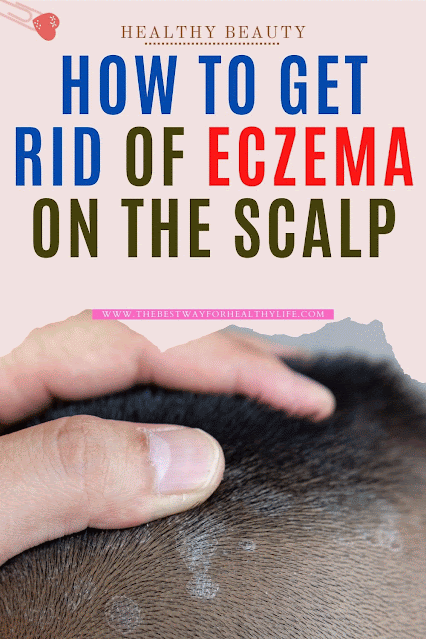How to Get Rid of Eczema On The Scalp
 |
| how to get rid of eczema on the scalp |
How to Get Rid of Eczema On The Scalp
Eczema can appear anywhere on the body, including the scalp. However, eczema on the scalp is often mistaken for dandruff. In fact, dandruff is just one of the symptoms that arise from this condition. In order not to be mistaken, let's find out more about eczema on the scalp.
Causes of eczema on the scalp Eczema is a condition when the skin is irritated, red, and itchy. Not only on the body, but this condition can also appear on the scalp. Eczema on the scalp is also called seborrheic dermatitis. This condition is a chronic inflammation caused by excess production of sebum, which is natural oil produced by the sebaceous glands on the scalp.
Risk factor of eczema on the scalp
Actually, experts don't know exactly what causes eczema to appear on the scalp or why the scalp produces too much sebum. However, several possibilities that make you experience this are genetic factors (heredity), hormonal changes, and contact with irritant substances. In addition, you also have a greater risk of developing this condition if:
1. Have a health problem
Have health problems that weaken the immune system such as HIV and Parkinson's disease.
2. Have a certain skin condition
Other skin problems like rosacea, psoriasis, and zits will give you a greater risk of developing eczema.
3. Experiencing depression.
Depression and stress will trigger eczema on your scalp.
4. Take certain drugs
Some certain drugs that contain interferon, lithium, or psoralen will likely increase your chance to develop eczema.
5. Lack of sleep
Lack of sleep will trigger eczema on the scalp due to the inflammation of your skin, which is the response to your deprivation of sleep.
6. Cold, irritation, dry skin, and oily hair.
The above condition will also trigger eczema if you didn't treat those conditions properly.
Symptoms of eczema on the scalp
Symptoms of eczema on the scalp are characterized by various symptoms such as,
- The scalp is red, scaly, and very itchy.
- The scalp is oily, waxy, and even blister.
- The crust on the scalp can get infected and remove the clear fluid.
- If eczema spreads to the ear, clear fluid will emerge from the ear.
There is a change in skin color even though it has healed. Eczema on the scalp is often mistaken for ordinary dandruff. Indeed, one of the characteristics of eczema is the appearance of dead skin flakes that are raised or often called dandruff. However, what you need to look at is that the eczema of the scalp experiences temporary inflammation while not dandruff.
How to get rid of eczema on the scalp
Some of these treatments are options to get rid of eczema on your scalp,
1. Use the right shampoo
To treat eczema on the scalp, you need to find the right shampoo and hair care products. Please look for a shampoo that contains: Zink Pyrithione, Salicylic acid, Sulfur, Selenium sulfide, Ketoconazole
Clean your scalp with shampoo once every two days or according to the instructions. After eczema starts to disappear, keep using a shampoo that contains these ingredients once or twice a week.
2. Medicine
If your eczema has mild symptoms, the doctor will prescribe an antifungal cream or ointment. Usually, this cream contains coal tar or corticosteroids which help relieve irritation and exfoliation.
Meanwhile, on eczema with more severe symptoms, your doctor will prescribe mild drinking corticosteroids to help calm inflammation. Doctors can also prescribe topical corticosteroids to treat eczema which is characterized by redness, itching, and flaking.
Not only that but some topical non-corticosteroid drugs such as calcineurin inhibitors can also be prescribed. In very severe cases, the doctor will prescribe an antifungal medication for you to drink.
3. Natural treatment
Some natural ingredients that can help relieve the symptoms of eczema on the scalp are Tea tree oil, Olive oil, Aloe vera, and Foods that contain vitamins A, D, and B, zinc, probiotics, and omega 3. Eating more vegetables and fruits will help your body to prevent any inflammation that triggers eczema. Another best natural treatment is drinking turmeric water regularly to prevent eczema on the scalp.
Eczema is a recurring disease, therefore please find out the exact causes and triggers. Ask your doctor to help identify the trigger. In that way, you can make various prevention to avoid eczema. One more, never scratch it because it can make the condition worse.
Post a Comment for "How to Get Rid of Eczema On The Scalp"